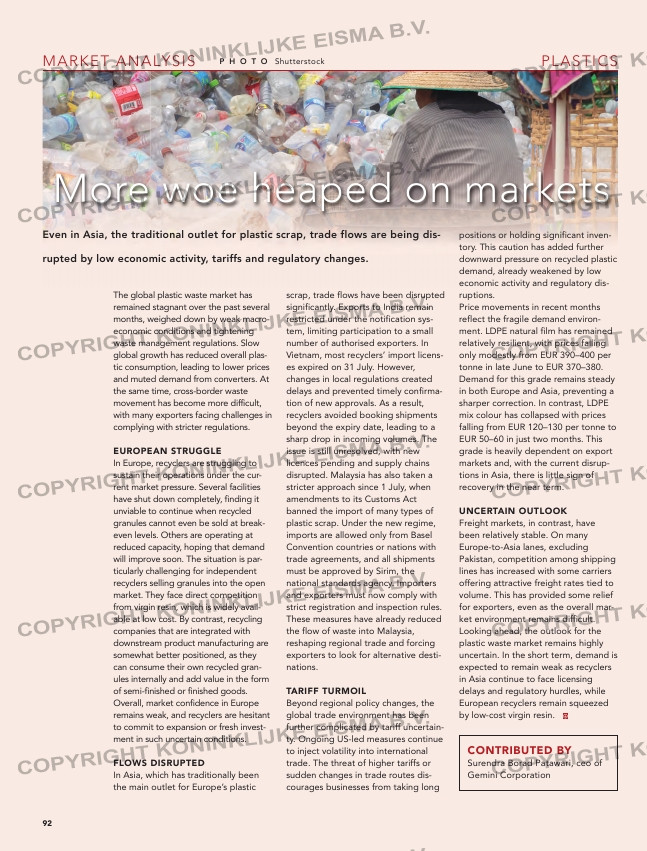Page 100 from: Recycling International September/October 2025

92
PLASTICSMARKET ANALYSIS
More woe heaped on markets
Even in Asia, the traditional outlet for plastic scrap, trade flows are being dis-
rupted by low economic activity, tariffs and regulatory changes.
The global plastic waste market has
remained stagnant over the past several
months, weighed down by weak macro-
economic conditions and tightening
waste management regulations. Slow
global growth has reduced overall plas-
tic consumption, leading to lower prices
and muted demand from converters. At
the same time, cross-border waste
movement has become more difficult,
with many exporters facing challenges in
complying with stricter regulations.
EUROPEAN STRUGGLE
In Europe, recyclers are struggling to
sustain their operations under the cur-
rent market pressure. Several facilities
have shut down completely, finding it
unviable to continue when recycled
granules cannot even be sold at break-
even levels. Others are operating at
reduced capacity, hoping that demand
will improve soon. The situation is par-
ticularly challenging for independent
recyclers selling granules into the open
market. They face direct competition
from virgin resin, which is widely avail-
able at low cost. By contrast, recycling
companies that are integrated with
downstream product manufacturing are
somewhat better positioned, as they
can consume their own recycled gran-
ules internally and add value in the form
of semi-finished or finished goods.
Overall, market confidence in Europe
remains weak, and recyclers are hesitant
to commit to expansion or fresh invest-
ment in such uncertain conditions.
FLOWS DISRUPTED
In Asia, which has traditionally been
the main outlet for Europe’s plastic
scrap, trade flows have been disrupted
significantly. Exports to India remain
restricted under the notification sys-
tem, limiting participation to a small
number of authorised exporters. In
Vietnam, most recyclers’ import licens-
es expired on 31 July. However,
changes in local regulations created
delays and prevented timely confirma-
tion of new approvals. As a result,
recyclers avoided booking shipments
beyond the expiry date, leading to a
sharp drop in incoming volumes. The
issue is still unresolved, with new
licences pending and supply chains
disrupted. Malaysia has also taken a
stricter approach since 1 July, when
amendments to its Customs Act
banned the import of many types of
plastic scrap. Under the new regime,
imports are allowed only from Basel
Convention countries or nations with
trade agreements, and all shipments
must be approved by Sirim, the
national standards agency. Importers
and exporters must now comply with
strict registration and inspection rules.
These measures have already reduced
the flow of waste into Malaysia,
reshaping regional trade and forcing
exporters to look for alternative desti-
nations.
TARIFF TURMOIL
Beyond regional policy changes, the
global trade environment has been
further complicated by tariff uncertain-
ty. Ongoing US-led measures continue
to inject volatility into international
trade. The threat of higher tariffs or
sudden changes in trade routes dis-
courages businesses from taking long
positions or holding significant inven-
tory. This caution has added further
downward pressure on recycled plastic
demand, already weakened by low
economic activity and regulatory dis-
ruptions.
Price movements in recent months
reflect the fragile demand environ-
ment. LDPE natural film has remained
relatively resilient, with prices falling
only modestly from EUR 390–400 per
tonne in late June to EUR 370–380.
Demand for this grade remains steady
in both Europe and Asia, preventing a
sharper correction. In contrast, LDPE
mix colour has collapsed with prices
falling from EUR 120–130 per tonne to
EUR 50–60 in just two months. This
grade is heavily dependent on export
markets and, with the current disrup-
tions in Asia, there is little sign of
recovery in the near term.
UNCERTAIN OUTLOOK
Freight markets, in contrast, have
been relatively stable. On many
Europe-to-Asia lanes, excluding
Pakistan, competition among shipping
lines has increased with some carriers
offering attractive freight rates tied to
volume. This has provided some relief
for exporters, even as the overall mar-
ket environment remains difficult.
Looking ahead, the outlook for the
plastic waste market remains highly
uncertain. In the short term, demand is
expected to remain weak as recyclers
in Asia continue to face licensing
delays and regulatory hurdles, while
European recyclers remain squeezed
by low-cost virgin resin.
CONTRIBUTED BY
Surendra Borad Patawari, ceo of
Gemini Corporation
P H O T O Shutterstock
92_maplastics.indd 92 09-09-2025 14:35



